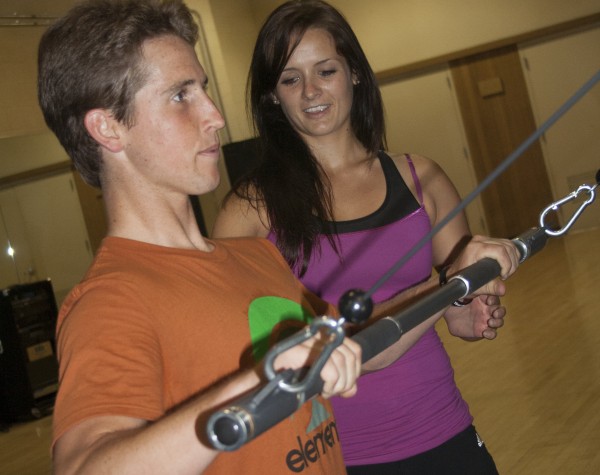 Search
MiraCosta
Search
MiraCosta
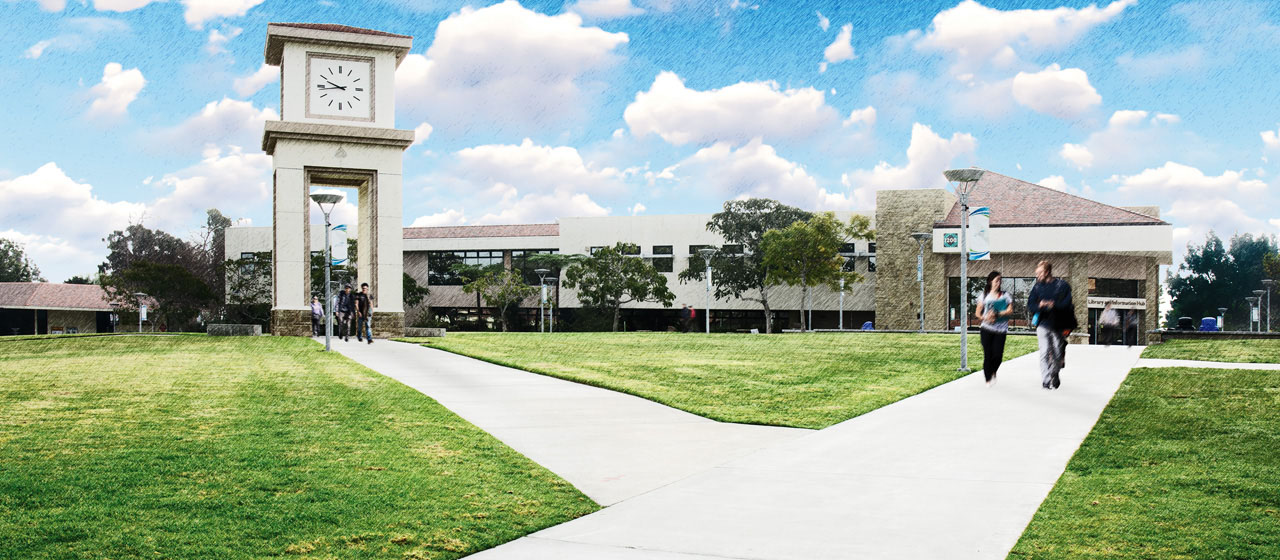
Kinesiology
Kinesiology
How to Read Course Descriptions
For more detailed information about a course, such as its content, objectives, and fulfillment of a degree, certificate, or general education requirement, please see the official course outline of record, available on the Courses and Programs webpage at https://www.miracosta.edu/governance/courses-and-programs-committee/curriculum-management-system.html.
Courses
KINE 100: Beginning Weight Training
Units: 0.5-1
Prerequisites: None
Enrollment Limitation: Maximum of four enrollments among KINE 100, KINE 101, KINE 102, and KINE 144.
Acceptable for Credit: CSU, UC
Laboratory 3 hours.
Course Typically Offered: Fall, Spring
This course implements the latest scientific functional training methodologies to enhance activities of daily living, weight loss, body appearance, bone density, stress reduction, core strength, balance, and coordination while decreasing the risk of orthopedic injury and low back pain through functional resistance training. It is designed for students interested in increasing muscular strength, muscular endurance, body composition, and movement performance. (May be repeated three times.) UC CREDIT LIMITATION: Any or all activity courses, maximum credit, 4 units.
KINE 101: Intermediate Weight Training
Units: 0.5-1
Prerequisites: None
Enrollment Limitation: Maximum of four enrollments among KINE 100, KINE 101, KINE 102, and KINE 144.
Acceptable for Credit: CSU, UC
Laboratory 3 hours.
Course Typically Offered: Fall, Spring
This stabilization training course addresses physical structural imbalances and emphasizes stabilization endurance training. Students perform stabilization training exercises in a proprioceptively enriched environment to improve alignment of the kinetic chain. They focus on increasing their ability to stabilize their joints, improve posture, and enhance neuromuscular efficiency. UC CREDIT LIMITATION: Any or all activity courses, maximum credit, 4 units. (Formerly KINE 141)
KINE 102: Advanced Weight Training
Units: 0.5-1
Prerequisites: None
Enrollment Limitation: Maximum of four enrollments among KINE 100, KINE 101, KINE 102, and KINE 144.
Acceptable for Credit: CSU, UC
Laboratory 3 hours.
Course Typically Offered: Fall, Spring
This strength endurance course improves stabilization endurance and increases prime mover strength. Students perform exercises in strength endurance, hypertrophy, and maximal strength phases to improve overall work capacity, enhance joint stabilization, and increase lean body mass. UC CREDIT LIMITATION: Any or all activity courses, maximum credit, 4 units. (Formerly KINE 143)
KINE 110: Walking for Fitness
Units: 0.5-1
Prerequisites: None
Acceptable for Credit: CSU, UC
Laboratory 3 hours.
Course Typically Offered: Fall, Spring, and Summer
Students enhance their individual health and well-being and develop positive attitudes toward life-long fitness and wellness through fitness walking. The course focuses on improving an individual's cardiopulmonary functioning, body composition, goal setting, nutritional awareness, and weight management through behavior management. Students must provide their own activity-tracking device or application. UC CREDIT LIMITATION: Any or all activity courses, maximum credit, 4 units.
KINE 112: Beginning Cardio Training
Units: 0.5-1
Prerequisites: None
Acceptable for Credit: CSU, UC
Laboratory 3 hours.
Course Typically Offered: Fall, Spring
This cardiorespiratory stabilization training course is designed to improve cardiorespiratory fitness in students through a variety of low-level intensity cardiovascular conditioning activities. Students learn how to develop cardiorespiratory stabilization training programs. Topics include the benefits of cardiorespiratory stabilization training, the cardiovascular system, and cardiorespiratory stabilization acute training variables, modalities, guidelines, and methods. UC CREDIT LIMITATION: Any or all activity courses, maximum credit, 4 units.
KINE 113: Intermediate Cardio Training
Units: 0.5-1
Prerequisites: None
Acceptable for Credit: CSU, UC
Laboratory 3 hours.
Course Typically Offered: Fall, Spring
This cardiorespiratory strength training course is designed to improve cardiorespiratory fitness in students through a variety of moderate-to-high level intensity cardiovascular conditioning activities. Students learn how to develop cardiorespiratory strength training programs. Topics include the benefits of cardiorespiratory strength training, the cardiovascular system, and cardiorespiratory strength acute training variables, modalities, guidelines, and methods. UC CREDIT LIMITATION: Any or all activity courses, maximum credit, 4 units.
KINE 114: Advanced Cardio Training
Units: 0.5-1
Prerequisites: None
Acceptable for Credit: CSU, UC
Laboratory 3 hours.
Course Typically Offered: Fall, Spring
This cardiorespiratory power training course is designed to improve cardiorespiratory fitness in students through a variety of high-level intensity cardiovascular conditioning activities. Students learn how to develop cardiorespiratory power training programs. Topics include the benefits of cardiorespiratory power training, the cardiovascular system, and cardiorespiratory power acute training variables, modalities, guidelines, and methods. UC CREDIT LIMITATION: Any or all activity courses, maximum credit, 4 units.
KINE 145: Yoga Teacher Training Foundation
Units: 3
Prerequisites: None
Acceptable for Credit: CSU
Lecture 2 hours, laboratory 3 hours.
Course Typically Offered: Fall, Spring
This course focuses on the fundamentals of yoga that are essential for both practice and teaching. Students learn proper body mechanics, anatomy, alignment principles, and breathing techniques as they relate to the performance and instruction of beginning yoga poses. Topics include the history and philosophy of yoga, Sanskrit terminology, injury prevention, and vocational opportunities.
KINE 147: Yoga Teacher Training Development
Units: 3
Prerequisites: None
Advisory: KINE145
Acceptable for Credit: CSU
Lecture 2 hours, laboratory 3 hours.
Course Typically Offered: Fall, Spring
This course provides students with the tools to design and teach a 60-minute yoga class with verbal clarity. It integrates yogic history and philosophy with yoga sutras, body mechanics and alignment, and complementary practices, such as breathing styles and developing intelligent flow sequences. Topics include principles of teaching yoga as well as lifestyle choices and ethics for yoga teachers. Students are required to attend an off-campus yoga class.
KINE 149: Yoga Teacher Training Integration
Units: 3
Prerequisites: None
Advisory: KINE 145, KINE 147, and KINE 150.
Acceptable for Credit: CSU
Lecture 2 hours, laboratory 3 hours.
Course Typically Offered: Fall, Spring
This course provides students with the tools to deepen their independent yoga practice in order to strengthen their teaching and develop a personal teaching style. Topics include designing, integrating, and implementing knowledge and teaching of asanas, pranayama techniques, meditation, and yogic history and philosophy. Students learn about Ayurveda, the subtle body, and yoga for special populations.
KINE 150: Beginning Yoga
Units: 0.5-1
Prerequisites: None
Acceptable for Credit: CSU, UC
Laboratory 3 hours.
Course Typically Offered: Fall, Spring, and Summer
This course introduces students to the beginning practice of yoga. Students learn the practice of gentle, restorative, and vinyasa flow to improve concentration, physical endurance, flexibility, balance, and posture. The course integrates basic breathing techniques to increase oxygen intake, enhance the mind-body connection, and reduce stress. UC CREDIT LIMITATION: Any or all activity courses, maximum credit, 4 units.
KINE 154: Intermediate Yoga
Units: 0.5-1
Prerequisites: KINE 150.
Acceptable for Credit: CSU, UC
Laboratory 3 hours.
Course Typically Offered: Fall, Spring, and Summer
This course introduces students to the intermediate practice of yoga. Students learn the practice of gentle, restorative, and vinyasa flow to improve concentration, physical endurance, flexibility, balance, and posture. The course integrates intermediate breathing techniques to increase oxygen intake, enhance the mind-body connection, and reduce stress. UC CREDIT LIMITATION: Any or all activity courses, maximum credit, 4 units.
KINE 155: Advanced Yoga
Units: 0.5-1
Prerequisites: KINE 150
Acceptable for Credit: CSU, UC
Laboratory 3 hours.
Course Typically Offered: Fall, Spring, and Summer
This course introduces students to the advanced practice of yoga. Students learn the practice of restorative and vigorous vinyasa flow to improve concentration, physical endurance, flexibility, balance, and posture. The course integrates advanced breathing techniques to increase oxygen intake, enhance the mind-body connection, and reduce stress. UC CREDIT LIMITATION: Any or all activity courses, maximum credit, 4 units.
KINE 156: Beginning Flexibility Training
Units: 0.5-1
Prerequisites: None
Acceptable for Credit: CSU, UC
Laboratory 3 hours.
Course Typically Offered: Fall, Spring
This corrective flexibility course is designed to increase joint range of motion, improve muscle imbalances, correct altered joint motion, and address posture distortions. Correct flexibility includes self-myofascial release and static stretching. UC CREDIT LIMITATION: Any or all activity courses, maximum credit, 4 units.
KINE 157: Intermediate Flexibility Training
Units: 0.5-1
Prerequisites: None
Acceptable for Credit: CSU, UC
Laboratory 3 hours.
Course Typically Offered: Fall, Spring
This active stretching course is designed to use agonists and synergists to dynamically move the joint into a range of motion. This form of stretching increases motorneuron excitability, creating reciprocal inhibition of the muscle being stretched. UC CREDIT LIMITATION: Any or all activity courses, maximum credit, 4 units.
KINE 158: Advanced Flexibility Training
Units: 0.5-1
Prerequisites: None
Acceptable for Credit: CSU, UC
Laboratory 3 hours.
Course Typically Offered: Fall, Spring
This functional flexibility course is designed to use force production of a muscle and the body's momentum to take a joint through the full available range of motion. Dynamic stretching uses the concept of reciprocal inhibition to improve soft tissue extensibility. UC CREDIT LIMITATION: Any or all activity courses, maximum credit, 4 units.
KINE 159: Yoga Teacher Training Implementation
Units: 3
Prerequisites: KINE 145, KINE 147, and KINE 150.
Acceptable for Credit: CSU
Lecture 2 hours, laboratory 3 hours.
Course Typically Offered: Fall, Spring
This course provides students with the advanced knowledge and skills to design and implement all-level yoga classes and yoga-based educational workshops. It integrates in-depth study of yogic philosophy and Sanskrit terminology with injury management and the use of props for asana progressions and regressions as well as intelligent sequencing and theming to create purposeful class experiences.
KINE 161: Beginning Martial Arts
Units: 0.5-1
Prerequisites: None
Acceptable for Credit: CSU, UC
Laboratory 3 hours.
Course Typically Offered: Fall, Spring
This course introduces students to the beginning skills of martial arts, which is a nonaggressive yet highly effective form of self-defense. Students learn about the history and philosophy of martial arts, safety procedures, standards of etiquette, body dynamics, and precise beginning-level movements in a setting of diligent, cooperative training. NOTE: A Gi uniform is required (approximately $40); please attend the first class before purchasing. UC CREDIT LIMITATION: Any or all activity courses, maximum credit, 4 units.
KINE 162: Intermediate Martial Arts
Units: 0.5-1
Prerequisites: KINE 161.
Acceptable for Credit: CSU, UC
Laboratory 3 hours.
Course Typically Offered: Fall, Spring
This course introduces students to intermediate skills of martial arts, which is a nonaggressive yet highly effective form of self-defense. Students learn about intermediate movements and body dynamics, safety procedures, and standards of etiquette in a setting of diligent, cooperative training. NOTE: A Gi uniform is required (approximately $40); please attend the first class before purchasing. UC CREDIT LIMITATION: Any or all activity courses, maximum credit, 4 units.
KINE 163: Advanced Martial Arts
Units: 0.5-1
Prerequisites: KINE 162.
Acceptable for Credit: CSU, UC
Laboratory 3 hours.
Course Typically Offered: Fall, Spring
This course introduces students to advanced skills of martial arts, which is a nonaggressive yet highly effective form of self-defense. Students learn about advanced movements and body dynamics, safety procedures, meditation techniques, and advanced defense strategies in a setting of diligent, cooperative training. NOTE: A Gi uniform is required (approximately $40); please attend the first class before purchasing. UC CREDIT LIMITATION: Any or all activity courses, maximum credit, 4 units.
KINE 190: Introduction to Kinesiology
Units: 3
Prerequisites: None
Acceptable for Credit: CSU
Lecture 3 hours.
Course Typically Offered: Fall, Spring, and Summer
This course introduces students to the field of kinesiology and nutrition, including its history, scope, and sub-disciplines. Students explore principles of kinesiology and career opportunities within kinesiology and nutrition/dietetics as well as professional characteristics and ethical responsibilities of those who work in the field. Topics include nutrition, biomechanics, fitness/posture assessments, assessment tool use (body fat, flexibility, cardiorespiratory), exercise prescriptions, and behavior management.
KINE 200: Physical Education in the Elementary School
Units: 3
Prerequisites: None
Acceptable for Credit: CSU
Lecture 3 hours.
Course Typically Offered: Fall, Spring, and Summer
This course teaches students how to develop physical education curriculum to best meet the needs of elementary school children based on national and state physical and health education content standards for California public schools. The course emphasizes the role and significance of physical education, instructional methods, and motor skill, movement, and total wellness concepts, including nutrition, disease prevention, and the adverse effects of drug/narcotic, alcohol, and tobacco use.
KINE 203: Techniques in Athletic Training
Units: 3
Prerequisites: None
Acceptable for Credit: CSU, UC
Lecture 2 hours, laboratory 3 hours.
Course Typically Offered: Fall, Spring
This course explores the basic fundamentals of athletic injury health care. It emphasizes prevention, recognition, basic assessment, immediate care, treatment, and rehabilitation of common athletic injuries. Topics include theory and application of taping and wrapping, basic first aid, emergency field care, and anatomical landmark recognition. UC CREDIT LIMITATION: Any or all KINE theory courses, maximum credit, 8 units.
KINE 204: Techniques and Analysis of Fitness and Weight Training
Units: 3
Prerequisites: None
Acceptable for Credit: CSU, UC
Lecture 2 hours, laboratory 3 hours.
Course Typically Offered: Fall, Spring
In this introduction to personal fitness training, students design a comprehensive fitness program that includes muscular strength and endurance, flexibility, and cardiorespiratory and core training to meet individual client needs. The course emphasizes program design, fitness assessment, posture analysis, biomechanics, exercise physiology, muscle anatomy, professional development, nutrition, goal setting, and behavior modification. UC CREDIT LIMITATION: Any or all KINE theory courses, maximum credit, 8 units.
KINE 210: Exercise Programs for Special Populations
Units: 3
Prerequisites: None
Acceptable for Credit: CSU
Lecture 3 hours.
Course Typically Offered: Fall, Spring
This course examines the exercise implications for special populations related to age, medical condition, and level of fitness. Topics include resistance, cardio, flexibility/yoga, and balance programs for heart conditions, stroke, diabetes, orthopedic problems, obesity, hyperlipidemia, pregnant, asthmatic, spinal cord injury, multiple sclerosis, epilepsy, cerebral palsy, older adult populations, and children. The course also covers the role of exercise in risk factor modification as well as contraindications to exercise for special populations.
KINE 292: Internship Studies
Units: 0.5-3
Prerequisites: None
Corequisite: Complete 75 hrs paid or 60 hrs non-paid work per unit.
Enrollment Limitation: Instructor, dept chair, and Career Center approval. May not enroll in any combination of cooperative work experience and/or internship studies concurrently.
Acceptable for Credit: CSU
Course Typically Offered: To be arranged
This course provides students the opportunity to apply the theories and techniques of their discipline in an internship position in a professional setting under the instruction of a faculty-mentor and site supervisor. It introduces students to aspects of the roles and responsibilities of professionals employed in the field of study. Topics include goal-setting, employability skills development, and examination of the world of work as it relates to the student's career plans. Students must develop new learning objectives and/or intern at a new site upon each repetition. Students may not earn more than 16 units in any combination of cooperative work experience (general or occupational) and/or internship studies during community college attendance.
KINE 296: Topics in Kinesiology
Units: 1-3
Prerequisites: None
Acceptable for Credit: CSU
Lecture 1 hour.
Lecture 2 hours.
Lecture 3 hours.
Course Typically Offered: To be arranged
This course gives students an opportunity to study topics in Kinesiology that are not included in regular course offerings. Each Topics course is announced, described, and given its own title and 296 number designation in the class schedule.
KINE 299: Occupational Cooperative Work Experience
Units: 1-4
Prerequisites: None
Corequisite: Complete 75 hrs paid or 60 hrs non-paid work per unit.
Enrollment Limitation: Career Center approval. May not enroll in any combination of cooperative work experience and/or internship studies concurrently.
Acceptable for Credit: CSU
Course Typically Offered: To be arranged
Cooperative Work Experience is intended for students who are employed in a job directly related to their major. It allows such students the opportunity to apply the theories and skills of their discipline to their position and to undertake new responsibilities and learn new skills at work. Topics include goal-setting, employability skills development, and examination of the world of work as it relates to the student's career plans. Students may not earn more than 16 units in any combination of cooperative work experience (general or occupational) and/or internship studies during community college attendance.
Campus Locations
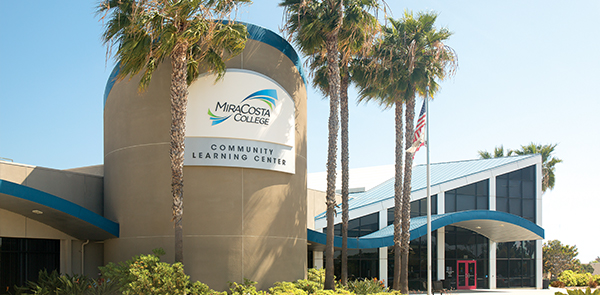
1831 Mission Avenue
Oceanside, CA 92058
760.795.8710
888.201.8480
View Map
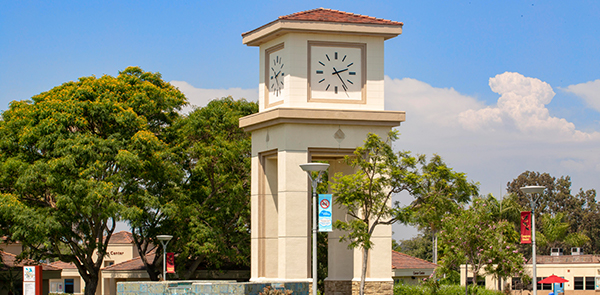
1 Barnard Drive
Oceanside, CA 92056
760.757.2121
888.201.8480
View Map
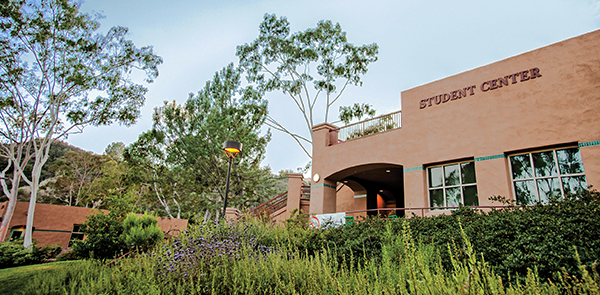
3333 Manchester Avenue
Cardiff, CA 92007
760.944.4449
888.201.8480
View Map
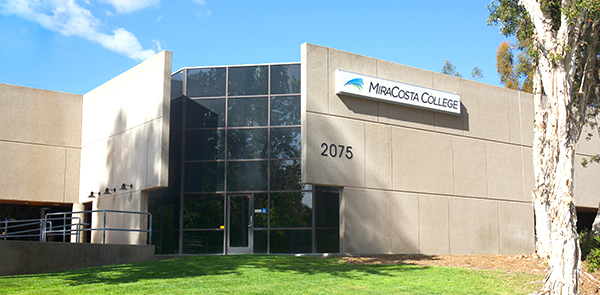
2075 Las Palmas Drive
Carlsbad, CA 92011
760.795.6820
888.201.8480
View Map
